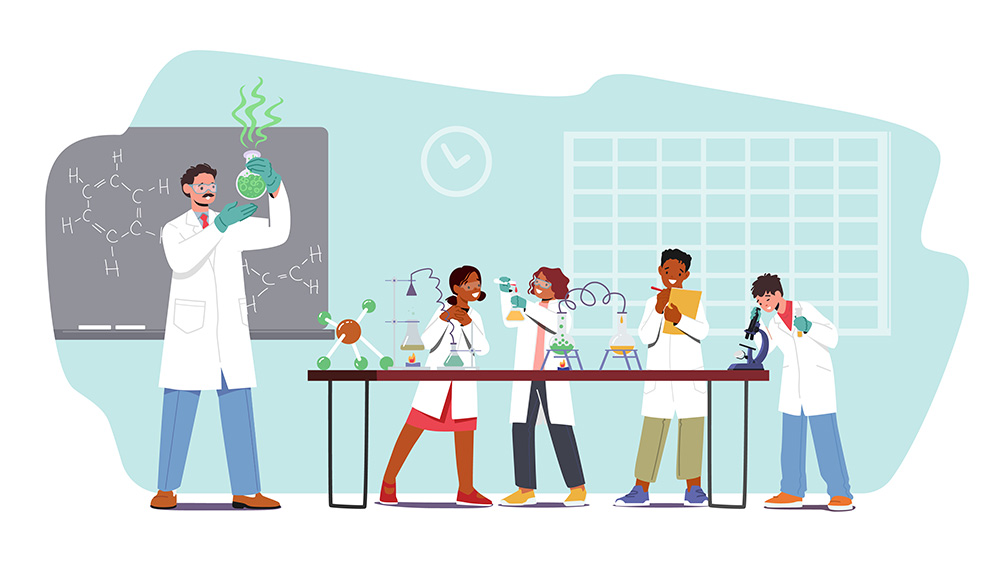




 01/05/2024
01/05/2024
“Specialising in the study of matter and its constituent substances, chemistry is a sub-discipline of science’’, says an IGCSE chemistry tutor in Delhi. Furthermore, covered are these materials' characteristics and the processes by which they combine to create new ones.
As molecules, ions, and atoms combine to form elements and compounds, these are the main subjects of chemistry. Chemical bonds are often how these chemical species interact with one another. Noteworthy is the fact that chemistry also studies the interactions of matter and energy.
Chemistry is the study of the characteristics, compositions, and structures of elements and compounds as well as how they change and the energy absorbed or released during those changes.
Chemistry's Place in Relation to Other Scientific Fields
The methodical examination of the natural world, its composition, and all of its components is referred to as "science." The natural universe is so vast that science has split itself up into many fields that focus on different facets of it.
Hence, it is possible to think of chemistry as a foundational science that inspired many other scientific subfields.
Domains in Chemistry
Physical chemistry is one of the five main branches of chemistry, along with organic, inorganic, analytical, and biochemistry chemistry.
IBGA’s IGCSE chemistry tutor in Gurgaon names some of these branches:
Several specialized areas of chemistry address cross-disciplinary issues in addition to these main branches. Environmental chemistry, nuclear chemistry, polymer chemistry, materials science, neurochemistry, medicinal chemistry, and thermochemistry are a few of these fields.
Intriguing: Real life and the role of chemistry
Using antibacterial soap, boiling water to destroy bacteria, eating safe food, and many more everyday chores all involve the application of chemistry. As you observe, chemistry is used in many different contexts every day; you probably just aren't aware of them.
Food Chemistry's Significance
All things are fundamentally made of chemicals. All food consists of chemical molecules, which are safe and frequently desirable. These molecules include carbohydrates, proteins, fats, vitamins, and fibre.
Chemicals are used extensively in the production and storage of food. Chemicals used in food preservation have greatly benefited the longer-term storage of food. Meals can be made better and more plentiful by using cans of nutritional supplements, flavorings, and food additives.
The world now has access to essential fungicides, insecticides, herbicides, and fertilisers thanks to chemistry, which also helps produce wholesome and nutrient-dense fruits, vegetables, and crops. Important fertilisers include sodium nitrate, ammonium sulphate, calcium superphosphates, and urea.
Chemistry's Significance in Medicines
Chemicals used to cure illnesses and relieve pain are known as medicines or pharmaceuticals. The field of chemistry has greatly advanced medical treatment. For example, chemistry helps with the creation and use of surgical supplies (sterile materials, prosthetic skin, and sutures).
A vast array of chemical processes and materials are used in clinical laboratory tests for analysis. According to the IGCSE teachers in Gurgaon, knowing such facts motivates one to choose IGCSE chemistry.
A few key medications in chemistry are:
Chemistry's Significance in Cosmetics
We use talcum powder, lotions, scents, and a host of other cosmetic products daily. These products are all made in labs utilizing chemicals that are harmful to our skin and well-being. Chemicals are the basis of all cosmetics, whether for adults or infants.
Chemistry is therefore crucial for preserving our skin's pH, maintaining it healthy, and getting rid of blemishes on it.
Benefits of choosing IGCSE chemistry
The syllabuses for the Cambridge IGCSE are specifically designed for students from overseas. We have worked with educators and schools all over the world for more than 25 years to create curricula that are appropriate for a variety of nations, school types, and skill levels of students.
Students taking the Cambridge IGCSE Chemistry course can be benefited with the help of an IGCSE chemistry tutor from IBGA, in various ways mentioned below: